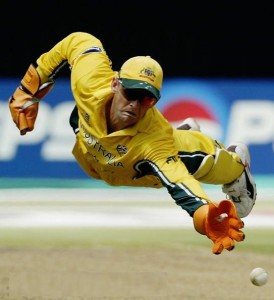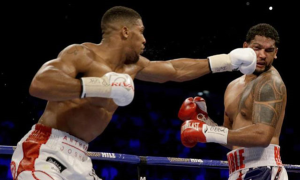In a cool Faridabad morning way back in 1996, a young Australian was given the gloves ahead of the Legendary Ian Helay and he made a scratchy 18 with the bat but managed to take two behind the stumps. That marked the entry of a certain character christened Adam Craig Gilchrist into International Cricket. The burly left hander traversed from his home of New South Wales to West Australia and earned his place in the Australian squad as it was making its strides towards its dominance in Cricket.
He was initially a lower order batsman in ODIs and was soon promoted to open the innings. It was here that he marked his name as a batsman with his unflinching style of hitting. He formed a formidable pair with Mark Waugh top the order for the Australians under Steve Waugh in late 1990s. He had a strong technique and an uncanny ability to hit the ball way out of the park. His strength was his destructive batting.
If his batting was good, his keeping was far better. He rarely missed the ball going past him and his wicket keeping was as Waugh or Ponting’s captaincy when the men from Down Under ruled the circuit. Despite showing his brilliance in the shorter format with the bat as well as the gloves, Gilchrist had to wait for 3 years until he got his Baggy Green against Pakistan in December 1999.
He had to replace Ian Helay who was by then the Record holder for most dismissals in Test Cricket. Indeed he was a worthy successor that he himself held that record before Boucher took over. At Brisbane before a crowd that savoured Helay, he made a mark with brilliant 81 and 5 dismissals on debut. Soon after the Hobart innings came when he showed the glimpses of what is in store to the world. Coming down at No 7, he made a marauding 169 to bail the side out of trouble. Since the opponents always had to worry despite getting 5 wickets of the great Australian lineup.
The stability and ability he brought to the Kangaroos side was beyond words. They were blessed with some great batsmen and bowlers. He filled the gap of being the finest keeper bat. Five down for a partly score, never worry. Gilly walks down to break the rhythm of the opposition and take the score to safety. Off to a great score, Gilly comes out to make it much bigger. Attack was his weapon but he could bail the side to safety more often than not.
With the gloves, his precision and balance was beyond comparison. He was impeccable with his stands and had a wonderful eye. Warne and Mcgrath became lethal with the advent of Gilly behind the stumps and his addition finally transformed the Australian side to total dominance. No wonder his debut coincided with their first run of 16 consecutive wins.
Soon enough, he formed a potent pair with Hayden in ODIs and then there was menace all around for the bowlers. They found no respite with both the south paws being unpardonable. His start in 2003 World Cup final against India killed the game for the Indian side. The next final was far better when he shattered the Sri Lankan attack for a destructive 150 to set up a hatrick of wins.
He may not have been lucky with the captaincy since Oz choose batsmen to be the candidates. But whenever he was provided a space he marked his presence felt. Ponting had taken over from Steve Waugh despite Gilly being the deputy but found himself injured in the tour to India in 2004. Gilly leading a strong side achieved what his full time captains could not do. He led the Australians to conquer the “Final Frontier” as Waugh used to describe. Gilly led side beat India in India. Neither could the record breaking skippers in Steve and Ponting do it.
Not just his game, but his character was laudable too. He was among the real gentleman to play in the recent decades. Not many batsmen “walk” when they know they are out but Adam set a standard by being a regular “walker” whenever he felt he was out. That brought him so many admirers across the globe. Though he is involved in constant chatter, seldom does he get himself into trouble. Probably he was a guy who knew the line better than his teammates.
Since he won his third world cup in 2007, he longed for calling it a day. In 2007-08 tour of India, Gilchrist retired from all forms of International cricket winning the hearts of fans and foes alike. Later he came to Indian Premier League, entertaining the fans for five seasons. In the second season, he led Deccan Chargers to a title win. This was with a team that was “wooden spooner” in the first season. His final two seasons was for Kings XI with whom he tried a lot to bring out the best.
His refusal to run the third run when the fielder was injured in a match at Dharmasala recently embarks the depiction of this guy. He was a real gentleman to grace the field. His announcement to retire from competitive cricket altogether gets us nostalgic. Seldom where we denied with joy and entertainment when he was on the field. Saluted to legend! He may not miss Cricket much (as he said himself) but the game of Cricket will miss him a lot!!










